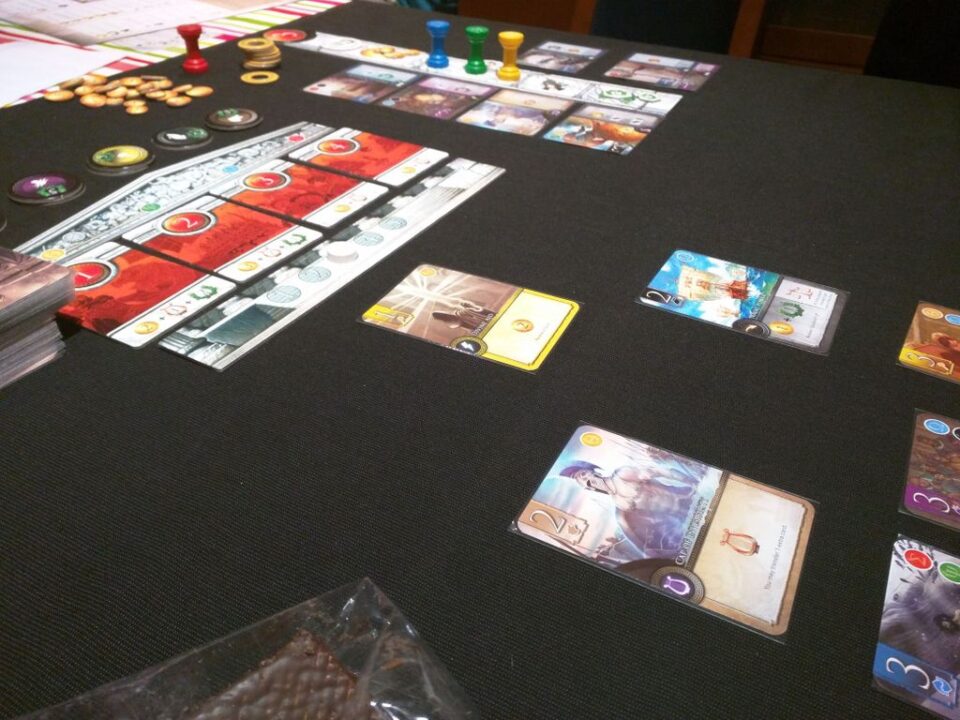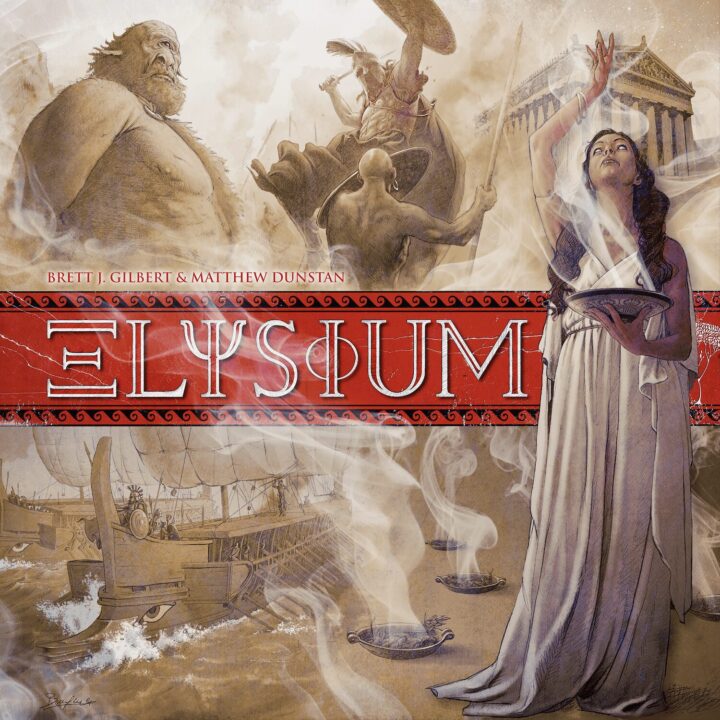Overview
Welcome to my comprehensive look at the world of myth-brewed rivalry and temple-building strategy in Elysium. This is more than just a review; it’s a vivid journey through the alchemy of card drafting and the rich tapestry of variable player powers woven into its core. Join me as I dive into the well of wisdom that is Elysium, assessing how the intertwining mechanics not only invigorate the game but also challenge the strategic maestros among us. Ready your divine decks and let’s decipher the hidden agendas within this game’s hallowed grounds.
How It Plays
Setting Up
To set up a game of Elysium, each player first chooses a god family and collects the corresponding cards, pillars, and starting gold. The main deck is built based on the families selected, and cards are drawn to form the Agora, which is the central play area where players will draft cards during the game.
Gameplay
Players take turns drawing cards from the Agora, using their pillars to acquire them, while strategically planning the order in which to play these cards. The key is to create card combinations that trigger powerful abilities and earn Victory Points, all the while navigating around the decisions and strategies of their opponents.
Winning the Game
After five epochs (rounds), the game ends. Players total their points from the cards, completed Legends, and any bonus objectives. The player with the most Victory Points ascends to the glory of victory in shelter_PROGRESS”>Elysium.
Want to know more? Read our extensive strategy guide for Elysium.
The Strategic Bliss in Card Drafting
In assessing the enchanting dance of Elysium, one must consider the rhythmic flow of card drafting, which frankly sits at the heart of my fascination. Every game night, as the Elysium box opens, my friends and I are not just commencing a session; we’re convening a draft that pulses with both luck and forethought. So often, amidst the banter, someone’s grasping sigh heralds a snatched card I coveted, its absence reshaping my strategy.
Aligning the Stars
Recalling one playthrough, the brilliance emerged in adapting to my available cards’ tapestry, weaving outright opportunities with the ephemeral ones. It’s beguiling, really, the interplay of choices, as you ride the transition from a strategy forged in hope to one sculpted by necessity.
Moments of Revelation
Indeed, engaging with the drafting mechanic in Elysium often pivots on climactic ah-ha moments. Quite suddenly, a storyline emerges as do characters with motivations and cravings for celestial endowment. Naturally, as these moiraic threads intersect, drafting becomes less about the cards and more about your narrative within this pantheon.
With card drafting dissected, let’s pivot to an equally integral cog in Elysium’s arsenal: Variable Player Powers.

The Symphony of Distinct Abilities
A Narrative of Variation – In every game of Elysium, I’m amazed at how variable player powers underscore the narrative arc. Each god’s powers offer a unique storytelling metaphor, painting victories and shortcomings with broad mythological strokes. Once, while assuming Hephaestus’ role, I crafted items that burned bright but fast, a proverbial tale of brilliance and decline. This nuanced play ensures that Elysium’s Review isn’t just an assessment – it’s an odyssey.
Tactical Tapestry – Furthermore, those powers weave deeply into Elysium’s tactical quilt. Strategy alongside Athena keenly differs from the brute force of Ares. Last week’s play recalled the craftiness of Odysseus—my strategic output sequenced like a clever gambit. The robustness of unique roles brings repeat players back, as re-experiencing factions feels imperative to master the game fully.
Now, steering through our mythic venture, it’s compelling to witness how these powers influence the broader tactical landscape we refer to as Strategic Depth Balance.
The Scales of Strategy in Elysium
Every playthrough of Elysium offers a familiar dilemma—how can I maximize my turn while limiting my opponent’s? Strategic pondering kicks in as you begin to see the patterns behind the deity-driven economy of gameplay.
Playtime Prognosis
Only after numerous games did the true strategic spectrum shine through. Initially, tactics seem straightforward: claim the best cards, cash in on quests. But therein lies the labyrinth. Underneath Elysium’s alluring surface lies a myriad of micro-decisions, each a stepping stone in setting up gratification or grief.
Adaptive Mastery
In our latest gaming get-together, assessing opponents’ motives became the unofficial mini-game, causing cash-ins at the critical crux. This, to be candid, is the tic-tac-toe turned chess of Elysium. In comptemplation of all elements, I wholeheartedly recommend Elysium for those who cherish a cerebral clash wrapped in elegant ezchest still, players hunger for a full-hearty recommendation — considering this thinking gamer premium-package, Elysium earns it with sumptuous strategic seasoning immersed in myth.
Conclusion
As I bring this review to a close, it’s clear that Elysium has carved out its own revered space within my board game collection. Through its intricate card drafting, distinctive variable player powers, and the intellectually satisfying strategic balance it maintains, the game consistently delivers an richly engaging experience. While the theme and graphics may support the overarching mythological concept, it’s these core mechanics that thrust Elysium into the pantheon of memorable gaming experiences. With every session fostering social engagements and dynamic table talk, I’m compelled to keep returning to its mythical realms. For those who relish complexity without overwhelming intricacy, Elysium is a game I confidently recommend.


